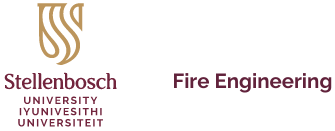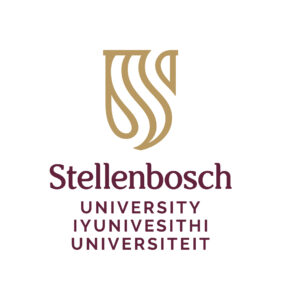Overview
The structured Masters in Engineering, MEng(S), is a structured hybrid online masters degree specialising in fire safety engineering. It is offered by the Department of Civil Engineering, to engineers across the world. The language of tuition is English.
The degree is offered in a hybrid online mode, in full- and part-time modality. Throughout the course of the degree students will only need to come to campus once for all fire engineering modules, and that will be to conduct fire experiments and practical sessions regarding fire safety systems. All exams, assessments and classes can be completed either face-to-face or online. It is expected that a full-time student will complete the programme in two years, while a part-time student will do it in three years.
The MEng(S) is a 180 credit degree on NQF Level 9 and consists of the following:
- 5 fire engineering modules: (1) Fire behaviour, (2) Fire engineering I, (3) Fire engineering II, (4) Techniques in fire engineering, and (5) Structural fire engineering (75 credits total)
- 3 elective modules out of: Data science, Project management, Advanced topics in engineering, Numerical methods, and Project economics & finance (45 credits total).
- A research thesis/project (60 credits)
Note: One credit represents 10 notional learning hours. “Notional learning hours” is the estimated time taken by the average student to achieve the specified outcomes of the module of programme.
Some of the electives (such as Data Science and Project Economics and Finance) are offered in a block format in the first semester, i.e. full-time during a one week period (Mo-Fr) plus pre-module work and post-module assignments. These options may vary from year to year and should be discussed with the Programme Coordinator. All modules will typically be available in hybrid mode such that they can be done remotely without coming to campus.
Modules
Fire Behaviour
This is a module designed to provide and assess an understanding of the physics and engineering aspects of fire and fire protection engineering. This module serves as the foundation for students wishing to go into structural fire engineering design or traditional fire engineering. Specific topics addressed are:
- Thermochemistry
- Heat transfer
- Fire plumes and smoke behaviour
- Steady burning of liquids
- Ignition and initiation of burning
- Spread of flame
- Pre- and post-flashover compartments:

Fire Engineering I
This is a module designed to put thefundamentals of fire science into practice. Students will develop and demonstrate an understanding of topics from first principles and apply them to real-world scenarios. This module focuses on the design of systems that ensure safe conditions for people during a fire incident. Specific topics covered include:
- Fire safety design
- Fire detection and alarm systems
- Smoke management
- Human behaviour in fire
Fire Engineering II
This is a module designed for students to develop and demonstrate an understanding of topics such material and product behaviour in fire, hazard and risk analysis, suppression systems and design and performance-based design, following on from Fire Engineering I. This module focuses on understanding different risks and the design of suppression systems that ensure safe conditions during a fire incident.Specific topics covered include:
- Material and product behaviour in fire
- Hazard and risk analysis
- Suppression systems and design
- Performance-based design
Techniques in Fire Engineering
This module is designed to provide and assess an understanding of techniques in fire engineering. Experimental and numerical techniques will be covered to ensure that students (a) have a sound knowledge and experimental understanding regarding fire safety systems, their operations, fire behaviour, and fire tests; (b) can understand and apply numerical techniques to solve fire dynamic problems with the use of tools such a zonal models and computational fluid dynamics (CFD).Specific topics covered include:
- Fire behaviour laboratory
- Detection system laboratory
- Suppression system laboratory
- Zonal modelling
- CFD modelling
Structural Fire Engineering
This is a structural design module in which students develop the ability to understand the complex nature of fire and how structures respond in the event of a fire. The module has been designed to be suitable for engineers from a variety of backgrounds, and not only structural engineers. The ultimate aim is to ensure that engineers can ensure structural safety, by analysing how materials and systems respond to elevated temperatures. Specific topics covered include:
- Fires and heat
- Fire severity and fire resistance
- Design of structures for fire
- Steel, concrete and timber structures
- General structures (composite, facades, etc.)
Research projects
Research projects and theses can be conducted with in a variety of fields. The team is active in research in fields such as:
- Structural fire engineering (steel, 3D printed concrete and timber)
- Green energy (solar, green hydrogen)
- Wildland urban interface (WUI) fires
- Fire modelling
- Biomass based products (passive protection and construction systems)
- The reuse and processing of waste
- Bulk storage (agricultural, synthetic products, etc.)
- Forensics and post-fire analyses
- Materials testing
- Artificial intelligence in fire safety engineering
- Informal settlement and refugee camp fire safety
Elective modules
Advanced Topics in Engineering Management
The purpose of the module is to present principles of general management within the context of technical disciplines. The course themes include the business environment and strategic management on a firm level, touching on the role of innovation and technology for competitiveness on a systems level from international and national perspectives. The course will include a significant focus on tools and techniques for technology and innovation management, exploring the link between technology management and business management taking a capabilities approach. These capabilities include acquisition, protection, exploitation, identification and selection. We relate traditional approaches to technology management to what it means for the context of the fourth industrial revolution, platform economies and innovation platforms.
Numerical Methods
The module focuses on matrix computations. We study the effective solution of linear systems, involving both square and rectangular matrices (least-squares). Direct as well as iterative methods are considered, with the emphasis on sparse matrices and matrices with structure. Numerical methods for the eigenvalue problem are also considered. Pitfalls such as numerical instability and ill-conditioning are pointed out. Model problems are taken from partial differential equations, data analysis and image processing. Theory, algorithmic aspects, and applications are emphasized in equal parts.
Project Economics & Finance
The module focuses on how to finance a business opportunity (project) that can be isolated from the rest of a company’s business activities. Financing through a combination of debt and equity are discussed, based on the future profitability of the project where project cash flow is the main source of capital recovery and the project assets are the only collateral. The concepts of construction loans and public- private partnerships are discussed. A number of case studies will be covered in the module, including projects to construct a bridge, a satellite and a wind turbine farm.
Project Management
The module focuses on advanced topics in project management, and it is expected that participants have either attended a project management course or have experience in managing projects. The module builds on the traditional project scheduling by addressing critical chain management and looks at managing project risks through the identification and assessment of risk potentials and mitigating strategies, including resource / cost management and contingency planning. The selection of appropriate teams and structures to facilitate contract management are discussed, along with executing project leadership through proper communication channels. The importance of procurement, from tender procedures through to supplier selection will be highlighted. The different nuances between commercial and research projects will be explained.
Data Science
Data science is the application of computational, statistical, and machine learning techniques to gain insight into real world problems. The main focus of this module is on the data science project life cycle, specifically to gain a clear understanding of the five steps in the data science process, namely obtain, scrub/wrangling, explore, model, and interpret. Each of these steps will be studied with the main purpose to gain an understanding of the requirements, complexities, and tools to apply to each of these life cycle steps. Students will understand the process of constructing a data pipeline, from raw data to knowledge. Case studies from the engineering domain will be used to explore each of these steps.




